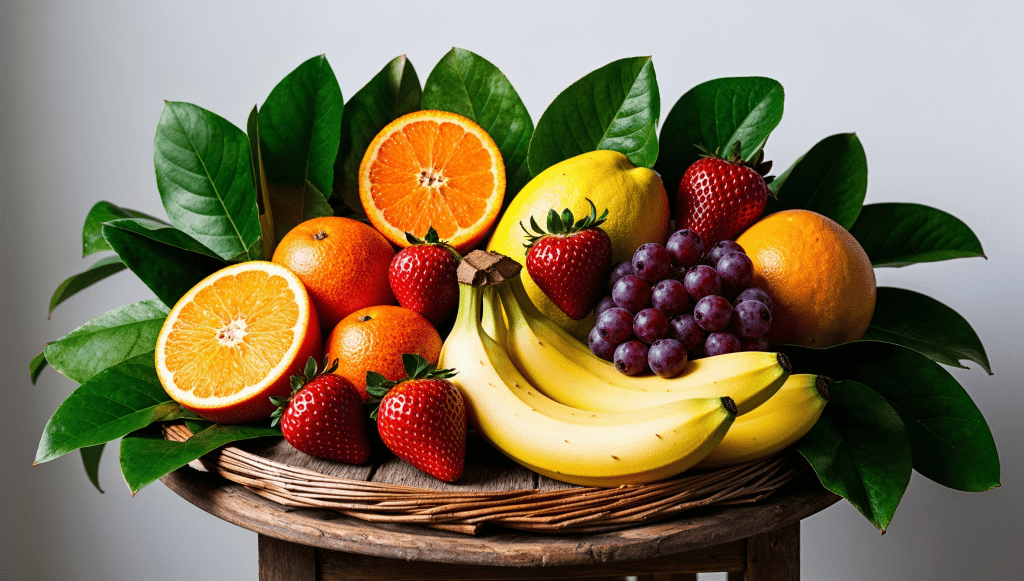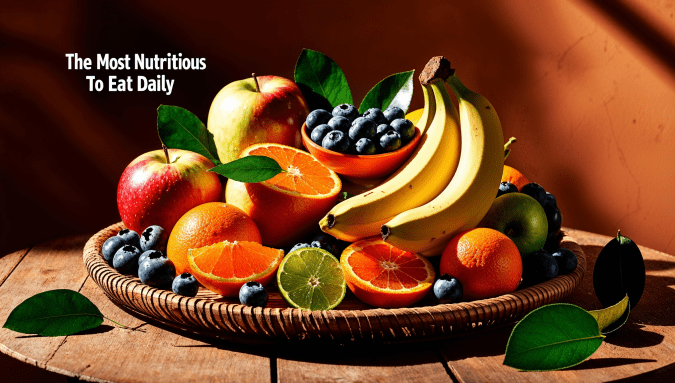Incorporating fruits into your daily diet is essential for overall health, as they are rich in vitamins, minerals, and fiber. Here are some of the most nutritious fruits to consider:
- Berries (Blueberries, Strawberries, Raspberries): Berries are high in antioxidants, particularly anthocyanins, which are linked to improved heart health and cognitive function. They are low in calories and high in fiber.
- Apples: Apples are a great source of fiber and vitamin C. They contain various phytochemicals that may help reduce the risk of chronic diseases.
- Bananas: Rich in potassium and vitamin B6, bananas provide quick energy and support heart health.
- Oranges: Known for their high vitamin C content, oranges also provide fiber and several antioxidants that boost immune function.
- Kiwifruit: Kiwis are packed with vitamins C and E, potassium, and dietary fiber. They have unique enzymes that aid digestion.
- Avocado: Although technically a fruit, avocados are high in healthy fats (monounsaturated fats), fiber, and various nutrients including potassium and vitamins E and K.
- Pomegranates: These fruits are rich in antioxidants, particularly punicalagins, which may help lower inflammation and improve heart health.
- Grapefruit: Grapefruit is low in calories but high in vitamins A and C, as well as antioxidants that may help with weight management.
- Papaya: Papaya is rich in vitamin C, vitamin A, and digestive enzymes like papain that aid digestion.
- Cherries: Cherries contain antioxidants like melatonin that may improve sleep quality and reduce inflammation.
Frozen Fruits vs. Fresh Fruits: Nutritional Comparison
When comparing frozen fruits to fresh fruits, both have their advantages:
- Nutrient Retention: Frozen fruits are typically harvested at peak ripeness and immediately frozen, preserving most of their nutrients. In contrast, fresh fruits can lose nutrients during transportation and storage.
- Convenience: Frozen fruits are often more convenient as they have a longer shelf life and can be used in smoothies or cooking without the need for washing or peeling.
- Cost-Effectiveness: Frozen fruits can be more economical than fresh ones, especially when certain fruits are out of season.
However, it’s essential to check for added sugars or preservatives in frozen fruit products to ensure you’re getting the healthiest option available.
Fruits with the Highest Antioxidant Content
Antioxidants play a crucial role in protecting the body from oxidative stress. Here are some fruits known for their high antioxidant content:
- Blueberries: Often touted as one of the highest antioxidant-rich fruits due to their high levels of anthocyanins.
- Blackberries: Packed with vitamins C and K along with powerful antioxidants.
- Cranberries: Known for their ability to prevent urinary tract infections, they also have strong antioxidant properties.
- Pomegranates: Rich in punicalagins and other antioxidants that may help reduce inflammation.
- Goji Berries: These small red berries are packed with antioxidants and vitamins A and C.
- Raspberries: High in dietary fiber and antioxidants like quercetin.
- Cherries: Contain anthocyanins that provide anti-inflammatory benefits.
- Acai Berries: Known for their high levels of anthocyanins and omega fatty acids.
Benefits of Eating Dried Fruits
Dried fruits can be a nutritious addition to your diet when consumed in moderation:
- Nutrient Density: Dried fruits retain many nutrients from their fresh counterparts but are more concentrated due to the removal of water content. For example, dried apricots are rich in vitamin A and iron.
- High Fiber Content: Dried fruits often contain two to three times more fiber than fresh fruit, aiding digestion and promoting satiety.
- Antioxidants: Many dried fruits are high in antioxidants such as polyphenols which can help protect against chronic diseases .
- Convenience: Dried fruits make for a portable snack option that can be easily added to meals or eaten on-the-go.
- Natural Sweetness: They can satisfy sweet cravings while providing nutritional benefits compared to processed sugary snacks .
However, it’s important to be mindful of portion sizes due to their higher calorie density compared to fresh fruit.

Incorporating More Exotic Fruits into Your Diet
Exotic fruits can add variety and unique flavors to your meals. Here’s how you can include them:
- Smoothies: Blend exotic fruits like dragon fruit or passion fruit into smoothies for a nutrient boost.
- Salads: Add slices of mango or papaya to salads for a tropical twist.
- Snacks: Try dried versions of exotic fruits like jackfruit or longan as snacks.
- Desserts: Use exotic fruits like lychee or rambutan in desserts such as sorbets or fruit salads.
- Cooking: Incorporate exotic fruits into savory dishes; for example, use pineapple in stir-fries or salsas.
By experimenting with different recipes and presentations, you can enjoy the diverse flavors and health benefits that exotic fruits offer while keeping your diet exciting and nutritious.
In conclusion, incorporating a variety of nutritious fruits—whether fresh, frozen, dried, or exotic—into your daily diet can significantly enhance your overall health while providing essential vitamins, minerals, antioxidants, and dietary fiber necessary for optimal well-being.












